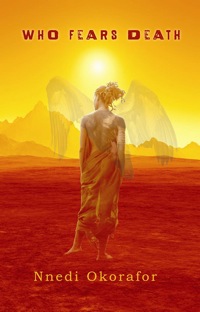Some stories challenge the reader to their very core. They come from a place both strange and familiar, setting the reader back on their heels, causing them to reassess what they thought they knew. Sometimes these stories are true, like Anne Frank’s Diary, other times they are fiction like Upton Sinclair’s The Jungle or Harriet Beecher Stowe’s Uncle Tom’s Cabin. The new work of fiction from author Nnedi Okorafor, Who Fears Death, is member of the latter, a work that challenges notions and inspires change.
Set in a post-apocalyptic Africa, where the dusky-skinned Nuru tribe is perpetrating genocide on the dark-skinned Okeke, the tale follows Onyesonwu, which means “Who Fears Death.” The daughter of a rape committed by a Nuru on her Okeke mother, stubborn and willful Onyesonwu cannot find acceptance among the Okeke because of her mixed blood heritage. But it is that very heritage that may be her salvation, as mixed blood people, called Ewu, often have magical, mystical powers of shapechanging, the manipulation of matter and flesh, and travel to and from the spirit world. Is it possible that Onyesonwu is the prophesied one who will kill the Okeke’s greatest enemy, a Nuru magician who pursues the extermination of all the Okeke with ruthless efficiency?
Okorafor’s story is a magical realist tale. Okorafor has taken situations, beliefs, and culture from modern-day Africa and transplanted them into a speculative setting where she can explore them separate from history and current events. That is not to say that Okorafor is attempting to present an ideal or utopian vision of Africa, far from it, but rather that Okorafor wants to look deeply into a culture that is part of her own heritage, and the day to day way of life of many in modern day Africa. Close reading makes it evident that much of the narrative takes place in an analogue of the Sudan, and that the situations presented reflect what is going on there now and in the recent past.
The story is emotionally powerful, so much so that this reviewer often had to put down the book to deal with the emotions that Okorafor had so achingly evoked. Tears will accompany a reading of this novel, as well as disgust, coupled with a dash of hope. The story is a tragedy, so don’t expect a hero to ride in on a white charger at the last moment. By ending the tale in such a way, Okorafor spurs the reader on to do something about the real situation that Who Fears Death allegorizes.
Onyesonwu is a character that even this reviewer, a WASP male, could identify and sympathize with. When Onyesonwu chooses to undergo female circumcision (described in graphic detail, so it is not for the faint of heart) in order fit into her community, this reviewer could find instances in his own past of attempting to the same, though not in so drastic a fashion. Onyesonwu’s desire and pain became my own desire and pain, even though my own life experience is so vastly different. This scene is one of the most powerful in the book, and the conflicting emotions and reasons for Onyesonwu choosing to undergo a horrendous procedure not required of her are eloquently wrought by Okorafor. If the reader extrapolates this scene to such practices in the modern age, and applies the situation of Onyesonwu to the women of Africa today, one is challenged to rethink one’s approach to women who have undergone such a procedure. And a lot of the novel is like this. A seemingly easy cause or decision on the part of a modern, moral, and caring individual, such as protesting female circumcision, is tested. In a way, humanity intrudes on something perhaps only previously understood in slogans.
The novel is very violent, (rape, female circumcision, bloody battle, magical destruction) and frank about the sexual act, so those with delicate sensibilities should read in small stages. But the book is a novel worth every moment of the tears it brings. Though a fantasy, the story is real, painfully real. Onyesonwu became as a sister, a person I would want to protect, but also someone I would follow into the depths of hell should she but ask it. Okorafor writes with emotional impact, not allowing the reader to simply slip into easy familiarity with the story, instead always challenging, always probing. Who Fears Death is fantasy like you have never read it before. Sure to be an award winner, Who Fears Death is the face of modern fantasy—topical, stunning, and perception altering.
John Ottinger writes nonfiction about science fiction and fantasy. Read his book review blog at Grasping for the Wind.










